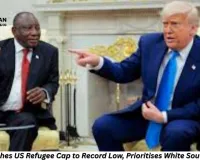Trump Tariffs Face U.S. Supreme Court Scrutiny on November 5; Ruling Could Redefine Presidential Power and Global Trade
Digital Desk

The U.S. Supreme Court will begin hearings on November 5 to determine whether President Donald Trump has the authority to impose sweeping global tariffs without congressional approval — a case that could reshape American trade policy and influence global markets.
The legal challenge centers on Trump’s 2025 “Liberation Day” tariffs, which placed a 10% levy on nearly all imports and raised some duties to as high as 50%. The administration justified the move under the International Emergency Economic Powers Act (IEEPA), claiming that long-standing trade deficits posed a “national emergency” threatening America’s industrial base.
Critics argue the declaration was unconstitutional, noting that the U.S. has maintained trade deficits since 1975 without invoking emergency powers. The case, brought by a coalition of small importers led by Learning Resources, Inc., questions whether IEEPA grants the president the right to alter customs duties — a power historically reserved for Congress.
The Court will consider two key issues: jurisdiction and presidential authority. Petitioners contend their claims fall under federal district court jurisdiction and that Trump’s actions exceed IEEPA’s limits. They also cite the “major questions doctrine,” warning that unchecked executive tariff powers would erode the constitutional separation of powers.
Defending the administration, government lawyers maintain that IEEPA’s broad language empowers the president to act in the national interest, including in trade matters.
A ruling against Trump could invalidate all tariffs imposed under IEEPA, forcing the White House to restart trade measures under other legal frameworks such as Section 301 or Section 232, both of which require lengthy investigations.
Analysts say the verdict could have far-reaching consequences for global trade, particularly for partners like India, the European Union, and Japan. A limitation on presidential trade powers could stabilize international markets — but a ruling in Trump’s favor may usher in a new era of executive-driven economic policy.

.jpg)

.jpg)



.jpg)


.jpg)
